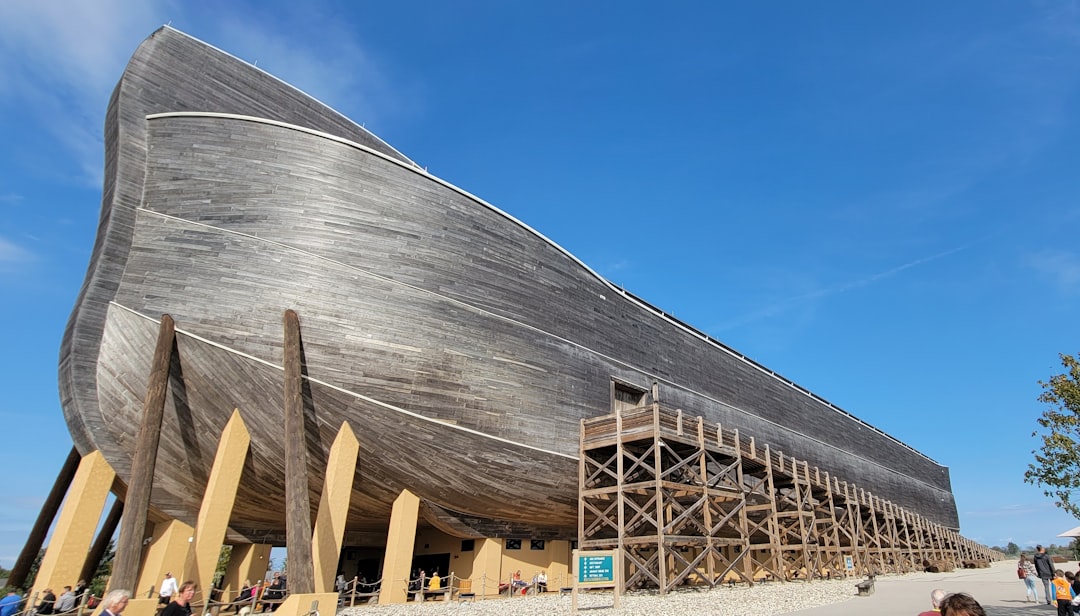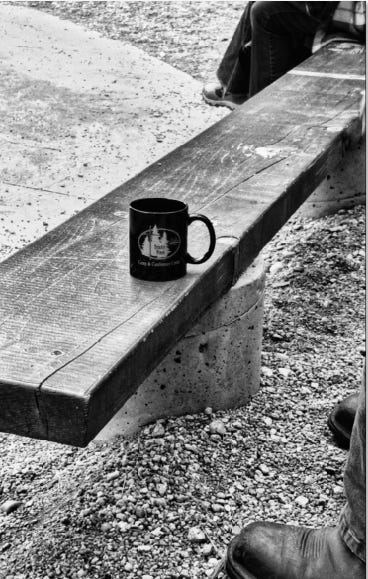“The church can never be ‘on a mission’ because that presupposes an ‘off’ switch, and you can’t be ‘off mission’ and still be a church. The church is mission.”
—Leonard Sweet—
In this article:
Story — Missio Dei is Who We Are and What We Do
One of My Photos — “Early Morning in the Pines”
A short reflection on Genesis 7:16
Other links to Look At
Missio Dei: The Mission of God
Missio Dei is a Latin term that translates to "Mission of God" or "Sending of God." It refers to the idea that God is actively engaged in the world, working to fulfill God’s purpose and mission. This mission of God is not simply one of many activities of the church but instead encompasses all of creation and all aspects of human life. Most importantly, it focuses on God’s purpose and plan for redeeming and restoring all creation.
“It is not so much that God has a mission for his church in the world, but that God has a church for his mission in the world.” (David Bosch)
Missio Dei is not a program of the church; it is the purpose of God, for which God has built the church.
Missio Dei is not the calling of a few select “super-Christians;” it is the plan of God, to which all believers have been called and sent.
Missio Dei is not an optional elective; it is the mission of God, the very definition of the Christian life.
God is already at work in the hearts of humanity even before we take our first step in this mission. This is what we call prevenient grace—the grace of God that goes before us, given to every human being before we ever arrive on the scene. Prevenient grace gives every human being the opportunity and ability to turn to Christ and begin walking in the way of the Lord. Without it, we’d have no hope.
We may sometimes forget it, but God is not only at work within the four walls of my local church. God is at work in the world—all of it. The church has been sent into the world as a missionary—agents of God’s redemptive mission.
“Many times [Jesus] stopped his planned agenda to turn aside and care for someone else who seemed to be interrupting him.” (Jay Pathak and Dave Runyon)
Jesus often stopped what he was doing—even sometimes in the middle of a journey or while on an important errand—to care for the well-being of an individual. Jesus allowed his schedule and agenda to be interrupted for Missio Dei's sake. People are more important than my pre-determined schedule and plan for my time.
“Disciples of Jesus live a mission-shaped life. Every life is a missionary life. Every marriage is a missionary marriage. Every vocation is a missionary vocation. We’re all here on assignment.” (Leonard Sweet)
Being a Christian – a disciple of Jesus Christ – is not limited to the stuff we give our attention to during a two-hour window on Sunday morning. The Jesus-centered life is all-inclusive, encompassing every aspect of life. This is what it means to “live on mission” or to practice “missional living.”
Living into the Missio Dei means living a mission-shaped life, working hard to nurture mission-shaped marriages, embracing the missionary calling as an individual, a family, and a church, realizing that your chosen vocation is a missionary vocation with a missionary purpose and that we are all ambassadors of our Savior, sent to represent the Messiah in the messy world in which we live.
“The greatest issue facing the world today, with all its heartbreaking needs, is whether those who…are identified as “Christians” will become disciples…of Jesus Christ, steadily learning from him how to live the life of the Kingdom of the Heavens into every corner of human existence." (Dallas Willard)
Being identified as a Christian is not enough. We must become disciples. A disciple, by definition, embraces and carries out the plans and purposes of the Master. Discipleship involves a deep and personal commitment to the way of Jesus, seeking to live the way that Jesus lived (1 John 4:6).
As we walk with Jesus, we find ourselves walking in the way of the Missio Dei in every aspect of our human existence--daily life, relationships, work, and everything else that defines who we are. We are Christlike agents of transformation in our world. We embody love, justice, compassion, and grace, just as Jesus did.
“The church can never be ‘on a mission’ because that presupposes an ‘off’ switch, and you can’t be ‘off mission’ and still be a church. The church is mission." (Leonard Sweet)
We cannot turn Missio Dei off and on like a light switch. The church is always in a state of mission. It can be no other way. Instead of saying, “Our church is on mission,” it would be more appropriate to say, “Our church IS mission.” As the church, we do not exist to carry out a list of activities, create revenue streams to keep our operation afloat, or provide spiritual entertainment to those who enjoy such things.
Missio Dei is our identity; it’s who we are as the church.
“The mission of God—his purpose for all people and the whole earth—starts with creation in Genesis 1 and culminates with new creation in Revelation”
—Dean Flemming—
One of My Photos
“Early Morning in the Pines”
This last month I drove up the mountains to Cascade, Idaho, where I enjoyed being a part of family camp, or camp meeting as some old-timers still call it. It was a refreshing time of fellowship, worship, and meeting some new friends (and reconnecting with some I hadn’t seen for a very long time).
Each morning before 7 am I made the short climb to the backside of Trinity Pines Campground for morning devotional…and coffee, thank goodness. It kept my hands warm in the cool morning air. More importantly, my heart was warmed as we read the prayer of Paul in Philippians 1:9-11 —
And this is what I’m praying: that your love may overflow still more and more, in knowledge and in all astute wisdom. Then you will be able to tell the difference between good and evil, and be sincere and faultless on the day of the Messiah, filled to overflowing with the fruit of right living, fruit that comes through King Jesus to God’s glory and praise.
I came home and spent a few minutes playing with this simple photo of a Trinity Pines mug sitting alone on a bench near the campfire. I like the contrasting black and white with this one, along with the slightly hazy effect to mimic the pre-sunrise morning.
Do you have a photo that needs some repair and enhancement? Or, perhaps you have a photo that is among your favorites, but you’d like to see what else can be done with it. Click the link below for a free offer. I want to create something special from your photo.
A Short Reflection on Scripture
Genesis 7:16

In a corrupt, evil, and violent world, Noah remained a man of integrity and faithfulness to God across the many decades it took him (and probably his sons working with him) to complete the ark God had instructed him to build. God’s instructions became for Noah and those with him the “promises of life” (Brueggemann 1982, 80). In carrying them out, Noah exercised both faith—confidence in God’s integrity of character—and hope, hope that God indeed would fulfill the promises God had made.
—Genesis 7:13-16 (New Beacon Bible Commentary)
Yahweh shut them in; Noah and his family, both men and women, were shut in. And not only the humans but the creatures as well. They would survive, shut in as they were, because of God’s grace.
Noah, his family, and the animals are sealed in the ark by God's gracious command. God is about to push the reset button on the world.
This turn of events, however, is not by God’s design.
Back in the garden, Noah’s ancient ancestors had given in to the serpent’s deception, turning their backs on their loving Creator-Father. Cain followed, and in the ensuing generations, all humanity did the same. Each and every human being on the planet turned their back to follow the serpent.
Except for Noah. He remained faithful, we are told.
God gives him instructions for building a ridiculously massive ark.
Noah obeys.
People mock and laugh.
Noah obeys.
Humanity is no longer functioning as God’s image-bearing people.
Noah is.
Humanity has gone bad.
Noah is good.
In time, the rains will begin to fall and will not stop until the deep, dark waters of chaos and de-creation once again cover the earth.
Let me explain.
In the beginning—Genesis 1:2—we are told that before God’s powerfully creative words that separate and order the world in which we live, the earth was formless, empty, and nothing. Darkness covered the deep waters of the abyss.
Creation is full of color and teeming with life.
Not-yet-created is dark and empty.
Creation is ordered.
Not-yet-created is chaos…symbolized in ancient text by deep waters.
Creation is good.
Not-yet-created is not.
As the rains fall and the water rises above the highest mountains, the created world will succumb to the chaotic, deep waters of darkness, formlessness, and emptiness.
All the world except for the comparatively tiny hand-crafted vessel built in accordance with the plan and purpose of the Almighty Creator.
In the face of overwhelming evil, God purposed to save what was good.
Over years, the plan took shape.
Then the rains began.
They entered the ark.
And God shut them in.
A remnant…a seed of the good creation, floating atop the violent waters of de-creation. Noah and all the other occupants had been shut away by the hand of divine love.
In time, they would again leave the ark and walk once again upon dry land.
Vegetation would grow again.
Animals would repopulate the earth.
The human journey would continue.
God’s redemptive plan or re-creation would continue, but never again by the waters of chaos.
Noah, his family, and all the ark’s nonrational passengers would survive because Yahweh’s hand had shut them in. In the tragic sweep of the narrative, this is not a large detail, but even here the love and grace of God shines forth.
—Genesis 7:13-16(New Beacon Bible Commentary)
Links To Look At
Great Sea Monsters
God created the great sea monsters and every living creature that moves, with which the waters swarmed after their kind, and every winged bird after its kind; and God saw that it was good. —Genesis 1:21 (NASB) Wait. What? Sea monsters? Yes. Or, perhaps, you might prefer to call them dragons?
Just a Minute...I've Got To Put On My Incarnational Face
“And that is the wonder of all wonders, that God loves the lowly….God is not ashamed of the lowliness of human beings. God marches right in. He chooses people as his instruments and performs his wonders where one would least expect them. God is near to lowliness; he loves the lost, the neglected, the unseemly, the excluded, the weak and broken.’






